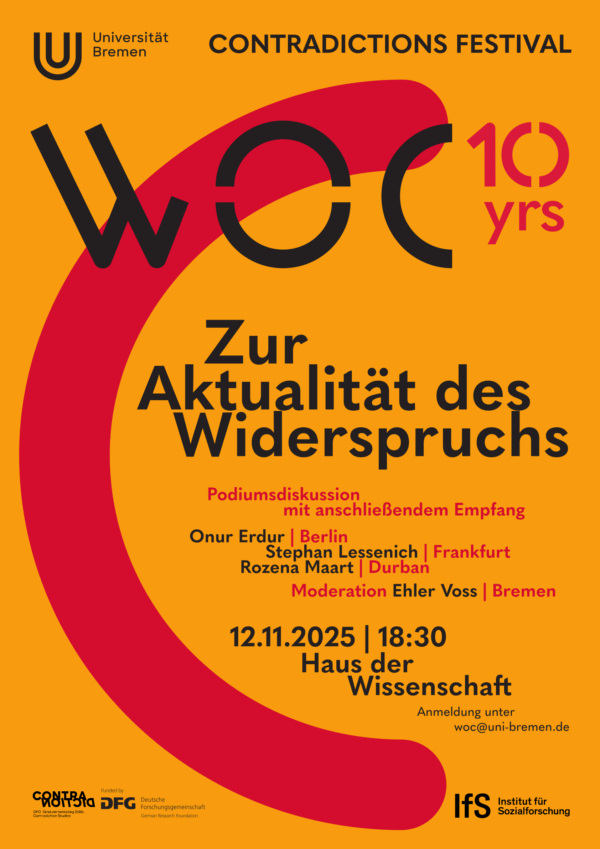Panel Discussions
Past Events
-
 On the Relevance of the Contradiction. 10 Years WOC – Contradictions Festival. Panel discussion
On the Relevance of the Contradiction. 10 Years WOC – Contradictions Festival. Panel discussionPanel Discussion:Dr. Onur Erdur | Department of Cultural History and Theory & WOC Guest Professor 2025Prof. Dr. Stephan Lessenich | Institute of Sociology, Goethe-University Frankfurt am Main & Institute for Social ResearchProf. Dr. Rozena Maart | University of KwaZulu-Natal Durban & GRK2686-Mercator Fellow Moderation:PD Dr. […]
-
 Grau, kalt und rechts? Wie reden wir über „Ostdeutschland“?
Grau, kalt und rechts? Wie reden wir über „Ostdeutschland“?What is “East Germany”? We want to talk about a region often perceived as gray, cold, and politically right-leaning. We aim to discuss how East German lifeworlds are constructed in media representations, political debates, and cultural and literary narratives, navigating between self-description and external attribution, between memory and the present.
-
 Film screening „Black faces in white? space” followed by a discussion with the filmmaker thabo thindi (Berlin / Huhudi Township)
Film screening „Black faces in white? space” followed by a discussion with the filmmaker thabo thindi (Berlin / Huhudi Township)“Black faces in white? space” is a documentary by …thabo thindi that explores the complexities of Black people living in Germany. Through personal stories and interviews, it highlights issues of racial exclusion, identity, and resilience. The film questions how Black presence reshapes or is constrained within spaces not designed for them.
-
 Antifeminismus im digitalen Raum. Der Einsatz von Invektiven und Widersprechen als Mittel der Delegitimierung feministischer Proteste
Antifeminismus im digitalen Raum. Der Einsatz von Invektiven und Widersprechen als Mittel der Delegitimierung feministischer ProtesteThe lecture is part of the conference “Das geht zu weit!” organized by the research group Diskursmonitor. Linguistic-communicative strategies of legitimizing and delegitimizing protest in public, media and political discourses will be discussed.
-
 Leiden an Unwahrheiten? Warum wir Wahrheit brauchen. Eine Diskussion zwischen Michael Hampe, Olivia Erna Maegaard Nielsen, Tammo Lossau und Jonas Trochemowitz
Leiden an Unwahrheiten? Warum wir Wahrheit brauchen. Eine Diskussion zwischen Michael Hampe, Olivia Erna Maegaard Nielsen, Tammo Lossau und Jonas TrochemowitzPeople suffer from contradictions and untruths. Against the background of this observation, Michael Hampe has developed a pragmatist concept of truth, which he believes can explain our striving for truth better than traditional theories of truth. But what does it mean, in this understanding, to […]
-
 35 Jahre Friedliche Revolution. Quo Vadis DDR-Erinnerungskultur in Hamburg
35 Jahre Friedliche Revolution. Quo Vadis DDR-Erinnerungskultur in HamburgWith reference to the traveling exhibition Demokratie vor Ort – Persönliche Erinnerungen von Hamburger:innen aus der DDR, a discussion among experts will take place on the significance and development of the memory of the GDR and its effects on our society today. More information about […]
-
 Was ist „Osteuropa“? Geschichte und Gegenwart eines widersprüchlichen Konzepts
Was ist „Osteuropa“? Geschichte und Gegenwart eines widersprüchlichen KonzeptsSince the total invasion of Ukraine by the Russian army, the term “Eastern Europe” has been omnipresent – whether in social media posts or feature articles: Everyone is talking about “Eastern Europe”. But what does “Eastern Europe” actually mean? Who belongs to it and who doesn’t? How useful is it to lump Russia, Poland, the Czech Republic and Ukraine into one category? Are there “good” Eastern Europeans who are allowed to be in the EU and NATO, and “bad” ones who (have to) stay out?
We want to discuss these and other questions together with our guests. The focus will be on the contradictions that characterize the concept of “Eastern Europe” – a concept whose meaning is negotiated daily between Western ideas and a multitude of complex identities
-
 Wine from South Africa. colonial origins and transnational struggles
Wine from South Africa. colonial origins and transnational strugglesWine has been grown in South Africa since 1658. This viticulture was linked to European colonialism from the very beginning: European sailors drank the wine that enslaved people had to grow on plantations. Colonial continuities of racism, capitalism and patriarchy run through apartheid to the […]
-
 Orality in Philosophy
Orality in PhilosophyThe role of orality in philosophy is an old and intriguing topic. Some have claimed that philosophy cannot exist as an oral tradition because sophisticated thought presupposes a written form. Others (including Plato) have claimed that writing destroys memory. Still others have formulated central statements […]
-
 Widersprechen gegen das Vergessen. Tschechoslowakische Zwangsarbeiter*innen in der Region Bremen
Widersprechen gegen das Vergessen. Tschechoslowakische Zwangsarbeiter*innen in der Region BremenForced laborers from the occupied territories of what was then Czechoslovakia (“Protectorate of Bohemia and Moravia”) are among the most invisible victims of National Socialist crimes in and around Bremen. It is very difficult to find traces of this group of prisoners, but we still […]